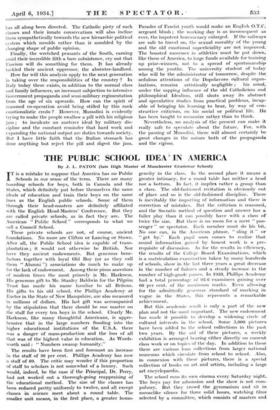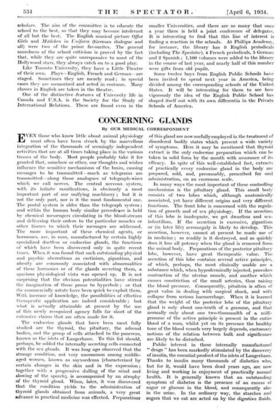THE PUBLIC SCHOOL IDEA' IN AMERICA
By J. L. PATON (late High Master of Manchester Grammar School) IT is a mistake to suppose that America has no Public Schools in our sense of the term. There are many boarding schools for boys, both in Canada and the States, which definitely put before themselves the same ideals of education and train their boys on the same lines as the English public schools. Some of them through their head-masters are definitely affiliated with the English Head-Masters' Conference. But they are called private schools, as in fact they are. The American " Public School " corresponds to what we call a Council School.
These private schools are not, of course, ancient foundations. No more are Clifton or Lancing or Stowe. After all, the Public School idea is capable of trans- plantation ; it would not otherwise be British. Nor have they ancient endowments. But generous bene- factors together with loyal Old Boy (or as they call them " Alumni ") associations do much to make up for the lack of endowment. Among these pious ancestors of modern times the most princely is Mr. Harkness. His generous gift to Mr. Stanley Baldwin for the Pilgrim Trust has made his name familiar to all Britons. His gifts to his old school, -the Phillips Academy at Exeter in the State of New Hampshire, are also measured in millions of dollars. His last gift was accompanied by the stipulation that there should be one master on the staff for every ten boys in the school. Clearly Mr. Harkness, like many thoughtful Americans, is appre- hensive that in the large numbers flooding into the higher educational institutions of the U.S.A. there was a danger of mass-production and the loss of all that was of the highest value in education. As Words- worth said : " Numbers swamp humanity."
The results have been first and foremost an increase in the staff of 50 per cent. Phillips Academy has now a staff of .69. The critic may wonder if this proportion of staff to scholars is not somewhat of a luxury. Such would, indeed, be the case if the Principal, Dr. Perry, had not worked out a thorough-going reappraising of the educational method. The size of the classes has been reduced pretty uniformly to twelve, and all except classes in science meet about a round table. The smaller unit means, in the first place, a greater homo- geneity in the class. In the second place it means a greater intimacy, for a round table has neither a head nor a bottom. In fact, it implies rather a group than a class. The old-fashioned recitation is obviously out of place and so is the old-fashioned discipline. There is inevitably the imparting of information and there is correction of mistakes. But the criticism is reasoned,• and the Socratic method of question and answer has a fuller play than it can possibly have with a class of twice the size. But there is no room for a mere " pas- senger " or spectator. Each member must do his bit. No one can, in the American phrase, " sling it " or " get by." Each pupil soon comes to realize that sound information gained by honest work is a pre- requisite of discussion. As for the results in efficiency, the results of the College Board Examinations, which is a matriculation examination taken by many hundreds of schools, show in the last three years a great decrease in the number of failures and a steady increase in the number of high-grade passes. In 1983, Phillips Academy had a total percentage of 92.6 examinees gaining over 60 per cent. of the maximum marks. Even allowing for the admittedly generous standard of marking in vogue in the States, this represents a remarkable achievement.
But this academic result is only a part of the new plan and not the most important. The new endowment has made it possible to develop a widening circle of cultural interests in the school. Some 5,000 pictures have been added to the school collections in the past two years. By the aid of these pictures, a weekly exhibition is arranged bearing either directly on current class work or on topics of the day. In addition to these there are various loan collections from larger national museums which circulate from school to school. Also, in connexion with these pictures, there is a special collection of books on art and artists, including a large art encyclopaedia.
The school runs its own cinema every Saturday night. The boys pay for admission and the show is not com- pulsory. But they crowd the gymnasium and sit in mouselike silence for three solid hours, watching films selected by a committee, which consists of masters and scholars. The aim of the committee is to educate the school to the best, so that they may become intolerant of all but the best. The English musical picture Office Girls and 11.1adchen in Uniform (German dialogue and all) were two of the prime favourites. The general soundness of the school criticism is proved by the fact that, while they are quite unresponsive to most of the Hollywood stars, they always catch on to a good play.
Like Toronto University, they have a Little Theatre of their own. Plays—English, French and German—are staged. Sometimes they are merely read ; in special cases they are memorized and acted in costume. Many classes in English are taken in the theatre.
One of the distinctive .features of University life in Canada and U.S.A. is the Society for the Study of International Relations. These are found even in the smaller Universities, and there are so many that once - a year there is held a joint conference of delegates. It is interesting to find that this line of interest is finding a reaction in the schools. At Phillips Academy, for instance, the library has 9 English periodicals (including The Spectator), 4 French periodicals, 5 German and 2 Spanish ; 1,100 volumes were added to the library in the course of last year, and nearly half of this number were gifts from old pupils.
Some twelve boys from English Public Schools have been invited to spend next year in America, being divided among the corresponding schools of the United States. It will be interesting for them to see how vigorously the idea of the English Public School has shaped itself out with its own differentia in the Private Schools of America.









































 Previous page
Previous page